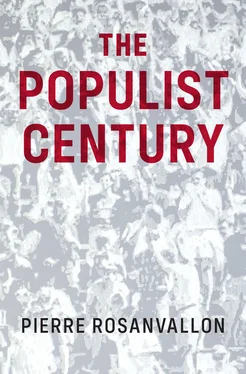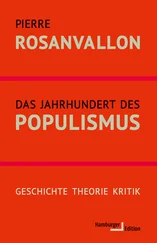11 11 On this point, see Philippe Urfalino, “Un nouveau décisionnisme politique: La philosophie du populisme de gauche,” Archives de philosophie 82, no. 2 (2019): 291–312. We need to recall here that the critique of the “debating classes” has been a red thread running through the type of anti-liberal thought (which would be called far-rightist today) that went from Donoso Cortés through Maurice Barrès and Charles Maurras to Carl Schmitt. It is also the root of the anti-intellectualism that animated all these authors. For them, the logic of intellectuals had to defer to the instinct of the humble, the only force that expressed the proper relation to reality.
12 12 This definition is proffered explicitly by Alain de Benoist in The Problem of Democracy, translated from the French (London: Arktos, [1985] 2011).
13 13 Hugo Chávez, inaugural address, 2007, cited in Cas Mudde and Cristóbal Rovira Kaltwasser¸ Populism: A Very Short Introduction (New York: Oxford University Press, 2017), p. 17. (I have modified the translation slightly based on the original Spanish. Chávez cited these two sentences verbatim from an official communication sent by Simón Bolívar to the governing council in Magdalena, Colombia, on April 27, 1826. See Simón Bolívar, Doctrina del Libertador, prologue Augusto Mijares, ed. Manuel Perez Vila, 2nd edn. [Caracas: Biblioteca Ayacucho, 1979], p. 224. –Translator’s note)
 3
3  A MODE OF REPRESENTATION: A LEADER EMBODYING THE PEOPLE
A MODE OF REPRESENTATION: A LEADER EMBODYING THE PEOPLE
Populism exalts a people as one body, a people bound together by its rejection of elites and oligarchies. This people also vilifies a political caste that it accuses of defending its own interests and of having lost any representative character. Hence the rejection of the political party structure, which is associated with rote speechifying and governance arrangements dissociated from reality; the party structure is also condemned for being paralyzed by incessant struggles for influence among rival groups. Hence, too, the preference for a different type of political organization, the “movement.” In addition to their original claim that they bring new blood into public life, populist movements are thus structurally distinguished from parties. Whereas parties were ideally conceived as the orchestrated expression of specific groups, whether these were defined socially, territorially, or ideologically, movements claim to want to bring all of society together. 1It was easy enough to see parties as representative of society because they emanated from well-defined existing realities (workers, farmers, craftsmen, businessmen, members of religious communities, and so on). Populist movements appear in a different light. First of all, they are constituted in more negative terms, through an accumulation of rejections and condemnations. At the same time, the people for whom they purport to speak has an increasingly nebulous character. The decline of political parties is linked in part to that reality, moreover. Not only are the parties victims of their rootedness in the past and their own ossification, but they no longer have a firm foothold in a society that has radically changed, a society in which social conditions are increasingly fragmented. 2In this context, a favorable echo of the populist message has emerged, for its globalization has led to the sense that commonalities could be produced within such fragmentation. But the denunciatory discourse of populism does not suffice to compensate for the deficit in representation that characterizes contemporary democracies. Hence the key role played by populist leaders as they strive to flesh out a coherent message.
The Latin American precedent
Since the mid-twentieth century, Latin American populism has illustrated in exemplary fashion this constitutive dimension of today’s populisms. The phenomenon is not surprising, for populism has emerged in less-industrialized countries that were structured not so much around a class system as around landownership and oligarchic forms of domination. The opposition between the people and the elites was thus the most telling one for a great many citizens. It was in this context that the theme of a leader embodying the people appeared. “I am not a man, I am a people”: these words, insistently repeated in the 1930s and 1940s by Colombian leader Jorge Eliécer Gaitán, set the tone for later populisms throughout the continent. 3Gaitán’s profile is worth lingering over, so well does it express the ambiguities of that nascent populism; Gaitán was as vehemently opposed to capitalism as he was attracted to the European fascisms that were then on the rise. Studying in Rome in 1926–7, he wrote a thesis under the direction of Enrico Ferri, a celebrated criminologist who had shifted from socialism to fascism. Having become Ferri’s protégé, Gaitán attended several of Mussolini’s meetings and later avowed that he had been impressed by that leader’s ability to dominate his audience and energize a crowd. He even carefully studied Il Duce’s gestures and the way he modulated his tone of voice to hold his audience’s attention – techniques that Gaitán went on to reproduce in his political action in Colombia. “The people’s candidate” in presidential elections, both an anti-capitalist and an adversary of the traditional oligarchy, Gaitán was assassinated in 1948. (We shall return to his writings later on.) Since then, his name has come to symbolize the Latin American spirit of populism, in its language as well as in its anti-oligarchic stance, with all the attendant ambiguities. Gaitán was admired by both Fidel Castro and Juan Perón; the latter also sought to become the Leader Embodying the People and spoke of “depersonalization” to characterize the plans that the revolution had embedded in him; 4implying that his individuality was being absorbed by that of the Argentineans.
Hugo Chávez, referring explicitly to Gaitán, hammered in the formula during the 2012 presidential campaign for the presidency in Venezuela. “When I see you,” he regularly said to the crowds gathered in meeting halls,
when you see me, I feel it, something tells me: “Chávez, you are no longer Chávez, you are a people.” In effect I am no longer myself, I am a people and I follow you, that is how I experience it, I have embodied myself in you. I have said it before and I say it again: we are millions of Chávezes; you too, a Venezuelan woman, you are Chávez; you too, a Venezuelan soldier, you are Chávez; you too, a fisherman, a farmer, a businessman, you are Chávez. Because Chávez is no longer myself. Chávez is a whole people! 5
Thus was reborn the old idea of mirror representation . 6In his first speech after his inauguration as president of the Republic in 1999, he went so far as to tell his audience: “Today, I am turning myself into your instrument. As for me, I scarcely exist, and I shall carry out the mandate you have entrusted to me. Get ready to govern!” 7
The leader as an organ of the people’s body
Until fairly recently, the examples of populism from Latin America still had an “exotic” aspect. But the increasing strength of populisms clearly shows that appreciation of the leader as “embodying the people” belongs to a vision of political representation that characterizes populisms in general. During the 1995 French presidential campaign, the Front National put the slogan “Le Pen, le peuple” on its posters. The matter was theorized later on by Ernesto Laclau and Chantal Mouffe, who had been recognized as the intellectual organs of left-wing populist tendencies. Laclau stressed that, “as a condition of its emergence, populism requires verticality of a new type. The people, as a collective actor, has to shape itself around a certain identity. But that identity is not automatic: it must be constructed.” 8This means, for Laclau, that alongside the “horizontal expressions of democratic equivalencies” there has to be a “vertical articulation around a hegemonic signifier that, in most cases, is the name of a leader.” 9Mouffe has the same view: “To turn heterogeneous demands into a collective will it’s necessary to have a figure who can represent that unity, and I don’t think there can be a populist movement without leadership, that’s for sure.” 10
Читать дальше

 3
3 










